#FRED MOTEN MY BELOVED!!!!!!!!!!!!!!!!!!!!!!!!!!!!!!!!!!!!!!!
Explore tagged Tumblr posts
Text
I think that “trans” is one word for it that is not just one word among others. You know what I’m saying? I have all these shorthand ways of putting shit that I steal from other people, but what I mean is that there are other words that one could use, but none of those words is replaceable. Not only are they not replaceable, they are not substitutable. . . . I’m beginning to think that these things [blackness and transness] converge in an irreducible way. They can’t be thought separately from one another, because both manifest themselves in regard to ritual practice. I don’t think about blackness as an identity. I think about blackness as a ritual practice, and I feel like I should think this about transness too.
Fred Moten, "All Terror, All Beauty."
[emphasis added]
#FRED MOTEN MY BELOVED!!!!!!!!!!!!!!!!!!!!!!!!!!!!!!!!!!!!!!!#fred moten#readings#trans#blackness#black studies#gender#mine
90 notes
·
View notes
Note
read any good books/listened to any good music lately?
Listening: Listening to KenTheMan (love the T shirt freestyle), listening to Gloss Up album again, listening to Monaleo, back listening to Roy Ayers Ubiquity/Roy Ayers, listening to A LOT of Horace Silver, Kelela.
I've been rerereading Wayward Lives, Beautiful Experiments by Saidiya Hartman my beloved and I'm reading The Universal Machine by Fred Moten which is beautifully written, but... when he writes outside of poetry that man really likes to throw his whole library at you and he isn't opening the pages or giving you bookmarks or anything.
3 notes
·
View notes
Text
mega-list of book recommendations
saw a mega-list of literary recommendations going around recently and was struck by the dearth of titles by poc, so i made a list of just poc titles to course-correct. keep in mind that i can only in good faith recommend what i’ve read, so i’m sure i’ve absolutely missed some integral titles. drop me an inbox message if you have more recs, i’m always open
canonical
the narrative of frederick douglass - frederick douglass
incidents in the life of a slave girl - harriet jacobs
the souls of black folk - w.e.b. dubois
montage of a dream deferred - langston hughes
cane - jean toomer
their eyes were watching god - zora neale hurston
the bean eaters - gwendolyn brooks
a raisin in the sun - lorraine hansberry
invisible man - ralph ellison
native son - richard wright
the autobiography of malcolm x - malcolm x
the fire next time - james baldwin
sister outsider: essays and speeches - audre lorde
things fall apart - chinua achebe
the garden of forking paths - jorge luis borges
one hundred years of solitude - gabriel garcia marquez
the color purple - alice walker
the woman warrior - maxine hong kingston
satanic verses - salman rushdie
beloved - toni morrison
sula - toni morrison
the house on mango street - sandra cisneros
the joy luck club - amy tan
DAMN. - kendrick lamar
plays
a tempest - aime cesaire
for colored girls who have considered suicide / when the rainbow is enuf - ntozake shange
fences - august wilson
dutchman - amiri baraka
the american play - suzan-lori parks
memoir
the light of the world - elizabeth alexander
how we fight for our lives - saeed jones
between the world and me - ta-nehisi coates
persepolis - marjane satrapi
men we reaped - jesmyn ward
heavy - kiese laymon
black boy - richard wright
the yellow house - sarah m broom
brothers and keepers - john edgar wideman
zami: a new spelling of my name - audre lorde
poetry
american sonnet for my past and future assassin - terrance hayes
the tradition - jericho brown
night sky with exit wounds - ocean vuong
citizen: an american lyric - claudia rankine
twenty love poems and a song of despair - pablo neruda
don’t call us dead - danez smith
eye level - jenny xie
life on mars - tracy k smith
a fortune for your disaster - hanif abdurraqib
postcolonial love poem - natalie diaz
i can’t talk about the trees without the blood - tiana clark
i wore my blackest hair - carlina duan
an american sunrise - joy harjo
oculus - sally wen mao
short stories
her body & other stories - carmen maria machado
interpreter of maladies - jhumpa lahiri
exhalation - ted chiang
ficciones - jorge louis borges
what is not yours is not yours - helen oyeyemi
sour heart - jenny zhang
essays
how to write an autobiographical novel: essays - alexander chee
trick mirror - jia tolentino
bad feminist - roxane gay
they can’t kill us until they kill us - hanif abdurraqib
we were eight years in power: an american tragedy - ta-nehisi coates
borderlands/la frontera: the new mestiza - gloria anzaldua
this bridge called my back: writings by radical women of color - ed. cherrie moraga and gloria anzaldua
white girls - hilton als
non-fiction
the new jim crow: mass incarceration in the era of colorblindness - michelle alexander
stamped from the beginning: the definitive history of racist ideas in america - ibram x kendi
bunk: the rise of hoaxes, humbug, plagiarists, phonies, post-facts, and fake news - kevin young
an alchemy of race and rights - patricia j williams
looking for lorraine: the radiant and radical life of lorraine hansberry - imani perry
the next billion users: digital life beyond the west - payal arora
fiction
passing - nella larson
caucasia - danzy senna
trust exercise - susan choi
on earth we’re briefly gorgeous - ocean vuong
corregidora - gayl jones
the fifth season - nk jemisin
the brief wondrous life of oscar wao - junot diaz
the round house - louise erdrich
there, there - tommy orange
little fires everywhere - celeste ng
the supervisor - viet than nguyen
kindred - octavia butler
the known world - edward p jones
the underground railroad - colson whitehead
the god of small things - arundhati roy
the vegetarian - han king
theory
playing in the dark: whiteness and the literary imagination - toni morrison
black skin, white masks - frantz fanon
mama’s baby, papa’s maybe: an american grammar book - hortense spillers
discourse on colonialism - aime cesaire
scenes of subjection - saidiya hartman
the signifyin(g) monkey - henry louis gates jr
pedagogy of the oppressed - paulo freire
feminist theory: from margin to center - bell hooks
black noise: rap music and black culture in contemporary america - tricia rose
decolonizing the mind: the politics of language in african literature - ngũgĩ wa thiong’o
black marxism: the making of the black radical tradition - cedric robinson
black feminist thought: knowledge, consciousness, and the politics of empowerment - patricia hill collins
black and blur (consent not to be a single thing) - fred moten
young adult
diary of a part-time indian - sherman alexei
the hate u give - angie thomas
emergency contact - mary hk choi
i am not your perfect mexican daughter - erika sanchez
poet x - elizabeth avecedo
#book recommendations#literature#book list#dark academia#poc writers#litblr#writeblr#light academia#academia#dark academia aesthetic#lit recs#book recs#feat. a disproportionate amount of AfAm bc it’s my subfield#bookblr#of foolish and wise#tori recommends#important#favorite post#dark academia post#dark academia aesthetics#blog vibe
438 notes
·
View notes
Text
City Lights Bookstore’s Antiracist Reading List | UPDATED
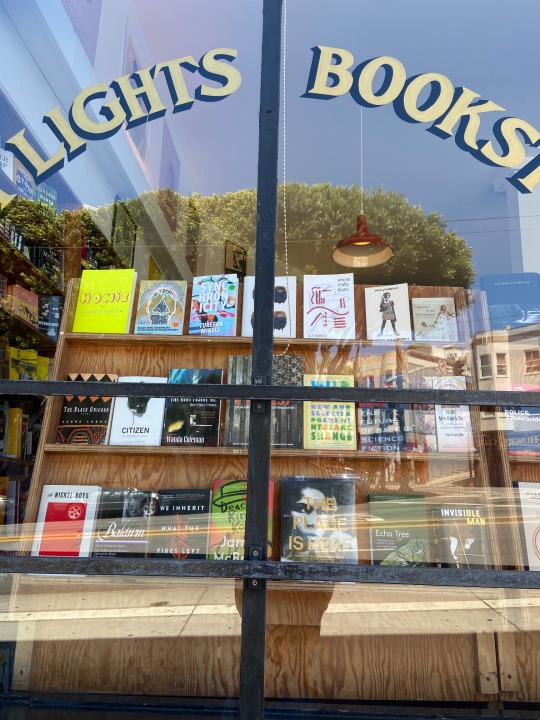
Human creativity is integral to revolutionary resistance—the urgent plea, the silenced cry, the righteous rage. It is imperative that we educate and illuminate ourselves to deepen our commitment to justice and equity for Black people and all people of color, and to pave the way for radical systemic change.
***
Of Poetry and Protest: From Emmett Til to Trayvon Martin Edited by Philip Cushway and Michael Warr 9780393352733 Norton Have Black Lives Ever Mattered? Mumia Abu-Jamal 9780872867383 City Lights Invisible Man Ralph Ellison 9780679732761 Vintage A Black Women's History of the United States Daina Ramey Berry and Kali N. Gross 9780807033555 Beacon W.E.B. Dubois' Data Portraits: Visualizing Black America The W.E.B. Du Bois Center at the University of Massachusetts Edited by Britt Rusert and Whitney Battle-Baptiste 9781616897062 Princeton Architectural Press Race Man: Selected Works 1960-2015 Julian Bond Edited by Michael G. Long 9780872867949 City Lights Hood Feminism: Notes from the Women That a Movement Forgot Mikki Kendall 9780525560548 Viking The Warmth of Other Suns: The Epic Story of America's Great Migration Isabel Wilkerson 9780679763888 Random House
The Echo Tree: The Collected Short Fiction of Henry Dumas Henry Dumas 9781566891493 Coffee House Everywhere You Don't Belong: A Novel Gabrielle Bump 9781616208790 Algonquin The Meaning of Freedom and Other Difficult Dialogues Angela Y. Davis Foreword by Robin D.G. Kelley 9780872865808 City Lights
No Fascist USA!: The John Brown Anti-Klan Committee and Lessons for Today’s Movements Hillary Moore and James Tracy Foreword by Robin D.G. Kelley 9780872867963 City Lights The New Jim Crow: Mass Incarceration in the Age of Colorblindness Michelle Alexander 9781620971932 The New Press Emergent Strategy: Shaping Change, Changing Worlds adrienne maree brown 9781849352604 AK Black Skin, White Masks Frantz Fanon Translated from the French by Richard Philcox 9780802143006 Grove The Wretched of the Earth Frantz Fanon Translated from the French by Richard Philcox Commentary by Jean-Paul Sartre and Homi K. Bhabha 9780802141323 Grove Citizen: An American Lyric Claudia Rankine 9781555976903 Graywolf How to Be An Antiracist Ibram X. Kendi 9780525509288 One World The Fire Next Time James Baldwin 9780679744726 Random House No Name in the Street James Baldwin 9780307275929 Vintage How To Be Less Stupid About Race: On Racism, White Supremacy, and the Racial Divide Crystal Marie Fleming 9780807039847 Beacon The History of White People Nell Irvin Painter 9780393339741 Norton Heaven Is All Goodbyes: City Lights Pocket Poet Series No. 61 Tongo Eisen-Martin 9780872867451 City Lights Afropessimism Frank WIlderson III 9781631496141 Liveright If They Come in the Morning . . . : Voices of Resistance Edited by Angela Y. Davis 9781784787691 Verso So You Want to Talk About Race Ijeoma Olua 9781580058827 Seal Troublemaker for Justice: The Story of Bayard Ruskin, the Man Behind the March on Washington Jacqueline Houtman, Walter Naegle, and Michael G. Long 9780872867659 City Lights We Are Not Yet Equal: Understanding Our Racial Divide Carol Anderson with Tonya Bolden Foreword by Nic Stone 9781547602520 Bloomsbury Stamped: Racism, Antiracism, and You - A Remix of the National Book Award-Winning Stamped from the Beginning Jason Reynolds and Ibram X. Kendi 9780316453691 Little, Brown Woke: A Young Poet's Call to Justice Mahogany L. Browne with Elizabeth Acevedo and Olivia Gatwood Illustrated by Theodore Taylor III Foreword by Jason Reynolds 9781250311207 Roaring Brook Betty Before X Ilyasah Shabazz with Renée Watson 9780374306106 FSG Clifford's Blues John A. Williams 9781566890809 Coffee House Native Son RIchard Wright 9780061148507 Harper Perennial Training School for Negro Girls Camille Acker 9781936932375 Feminist Press They Can't Kill Us Until They Kill Us: Essays Hanif Abdurraqib 9781937512651 Two Dollar Radio Just Mercy: A Story of Justice and Redemption Bryan Stevenson 9780812984965 One World The Source of Self-Regard: Selected Essays, Speeches, and Meditations Toni Morrison 9780525562795 Vintage Oreo Fran Ross 9780811223225 New Directions Sister Outsider: Essays and Speeches Audre Lorde Foreword by Cheryl Clarke 9781580911863 Crossing Press Ghost Boys Jewell Parker Rhodes 9780316262262 Little, Brown Monument: Poems New and Selected Natasha Trethewey 9780358118237 Mariner The Sword and the Shield: The Revolutionary Lives of Malcolm X and Martin Luther King Jr. Peniel E. Joseph 9781541617865 Basic Dear White People Justin Simien Illustrated by Ian O’Phelan 97814769809 37 Ink Black Panther: The Revolutionary Art of Emory Douglas Edited by Sam Durant Preface by Bobby Seale Foreword by Danny Glover 9780847841899 Rizzoli Power to the People: The World of the Black Panthers Stephan Shames and Bobby Seale 9781419722400 Harry N. Abrams Press In the Break: The Aesthetics of the Black Radical Tradition Fred Moten 9780816641000 University of Minnesota Press The Known World: A Novel Edward P. Jones 9780061159176 Amistad Counternarratives: Stories and Novellas John Keene 9780811225526 New Directions Beloved: A Novel Toni Morrison 9781400033416 Vintage The Bluest Eye: A Novel Toni Morrison 9780307278449 Vintage Playing in the Dark: Whiteness and the Literary Imagination Toni Morrison Vintage 9780679745426 Mumbo Jumbo Ishmael Reed 9780684824772 Scribner Our Nig: Or, Sketches from the Life of a Free Black Harriet E. Wilson Edited with an introduction by Henry Louis Gates Jr. and Richard J. Ellis 9780307477453 Vintage Burn This Book: Notes on Literature and Engagement Edited by Toni Morrison 9780061774010 Harper I’m Not Dying with You Tonight Gilly Segal and Kimberly Jones Sourcebooks Fire 9781492678892 The End of Policing Alex S. Vitale 9781784782924 Verso The Crisis of the Negro Intellectual: A Historical Analysis of the Failure of Black Leadership Harold Cruse 9781590171356 NYRB Classics How Capitalism Underdeveloped Black America: Problems in Race, Political Economy, and Society Manning Marable 9781608465118 Haymarket From #BlackLivesMatter to Black Liberation Keeanga-Yamahtta Taylor 9781608465620 Haymarket Still Black, Still Strong: Survivors of the War Against Black Revolutionaries Dhoruba Bin Wahad, Assata Shakur, and Mumia Abu-Jamal 9780936756745 Semiotext(e) Frederick Douglass: Prophet of Freedom David W. Blight 9781416590323 Simon & Schuster Parting the Waters : America in the King Years 1954-63 Taylor Branch 9780671687427 Simon & Schuster Pillar of Fire: America in the King Years 1963-65 Taylor Branch 9780684848099 Simon & Schuster At Canaan's Edge: America in the King Years, 1965-68 Taylor Branch 9780684857138 Simon & Schuster A Taste of Power: A Black Woman's Story Elaine Brown 9780385471077 Anchor Angela Davis: An Autobiography Angela Y. Davis 9780717806676 International Publishers Co. My Bondage and My Freedom Frederick Douglass 9780140439182 Penguin Narrative of the Life of Frederick Douglass, an American Slave, Written by Himself: A New Critical Edition Frederick Douglass and Angela Y. Davis 9780872865273 City Lights Black Reconstruction in America, 1860-1880 W.E.B. Du Bois 9780684856575 Free Press
97 notes
·
View notes
Photo

via 75 Books for the Next Four Years)
In the last weeks as I’ve found myself rereading George Orwell’s classic dystopian novel 1984, a work I never took to in high school yet felt even then, all the same, that the context of how the work was being taught had eluded the experiment of my sophomore English class. Orwell’s gray fantasia had been reduced to a Cold War allegory (if even that) about the joys and necessities of unlimited self-expression. In short, what happened in the world before or outside America in the late 1990s. This time round, more than 15 years later, after three presidents and two imperialist wars and so very much else, Orwell’s text strikes me less as science fiction or totalitarian parable. It describes a world I know, today, intimately. It renders the temperature of our corporatized media and the destabilizing rhetoric of the incoming administration under President-elect Trump.
On page 101, Winston wanders into a shop in the prole district forbidden to all Party members such as himself, in part to revisit the scene of his great crime some 50 pages earlier where he purchased a blank diary with the intent of recording language freed from the trappings of ubiquitous Newspeak. Orwell writes:
There was a small bookcase in the other corner, and Winston had already gravitated towards it. It contained nothing but rubbish. The hunting-down and destruction of books had been done with the same thoroughness in the prole quarters as everywhere else. It was very unlikely that there existed anywhere in Oceania a copy of a book printed before 1960.
This ever-eerie image of the destruction of knowledge compresses and resonances with so much of imperialist, colonialist, genocidal and fascist history: The book burning by the Nazis in May 1933 and then even further back to the criminalization of literacy for African slaves and indigenous peoples in colonial America. As Paula Gunn Allen reminds us: “The root of oppression is the loss of memory.”
Today’s inauguration signals the emboldened resurgence of fascism and white supremacy under the banner of global populism. I am chilled by yesterday’s news of how the Trump administration plans to completely gut and cut the National Endowment for the Arts as well as the National Endowment for the Humanities. In response, I asked a few dozens writers over text and email to respond to the following question.
“What book is necessary reading in the face of today’s inauguration?”
I am thankful for their generosity and fortitude, hopeful for the renewed commitment to staying informed as well as informing others. Perhaps such a task is the principle service upon which all of teaching, literature, the arts—not to mention our democracy and civil rights—relies. May we take root in these voices and texts, may we honor their differences, end the persistence of the distinct oppressions they point to and are drawn from, be ever vigilant to preserve the rites of their memories.
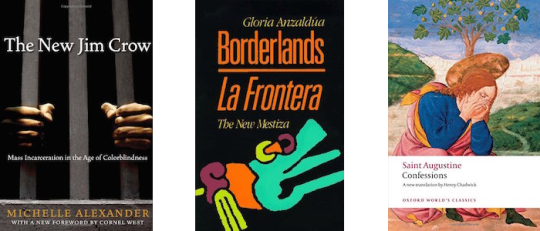
The New Jim Crow: Mass Incarceration in the Age of Colorblindness by Michelle Alexander ·Borderlands/La Frontera: The New Mestiza by Gloria Anzaldua · Confessions by St. Augustine
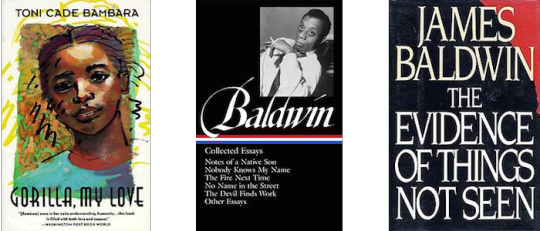
Gorilla, My Love by Toni Cade Bambara · Collected Essays by James Baldwin · The Evidence of Things Not Seen by James Baldwin

The Fire Next Time by James Baldwin · Meditations by Sister Wendy Beckett · The Image: A Guide to Pseudo-Events in America by Daniel Boorstin
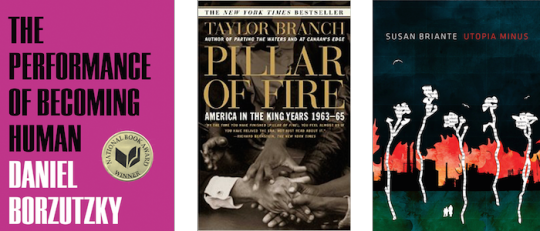
The Performance of Being Human by Daniel Borzutsky · Pillars of Fire: America and the King Years by Taylor Branch · Utopia Minus by Susan Briante

Heart of the Breath by Jim Brodey · Crowds and Power by Elias Canetti · Collected Poems by C.P. Cavafy

Start Where You Are by Pema Chodron · The Laugh of the Medusa by Hélène Cixous ·Liberation Imagination and the Black Panther Party: A New Look At the Panthers and Their Legacy edited by Kathleen Cleaver and George N. Katsiaficas

Between the World and Me by Ta-Nehisi Coates · Journal of an Ordinary Grief by Mahmoud Darwish · Intercourse by Andrea Dworkin

White by Richard Dyer · The Wretched of the Earth by Frantz Fanon · Black Skin, White Masks by Frantz Fanon

White Blight by Athena Farrokhzad · As I Lay Dying by William Faulkner · Discipline & Punish by Michel Foucault

The Activist by Renee Gladman · Conflict Resolution for Holy Beings by Joy Harjo ·Barbarian in the Garden by Zbigniew Herbert

Teaching to Transgress by bell hooks · Collected Poems by June Jordan · Reappraisals by Tony Judt
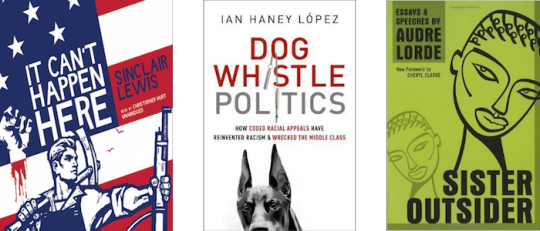
It Can’t Happen Here by Sinclair Lewis · Dog Whistle Politics: How Coded Racial Appeals Have Reinvented Racism and Wrecked the Middle Class by Ian Haney López · Sister Outsider by Audre Lorde
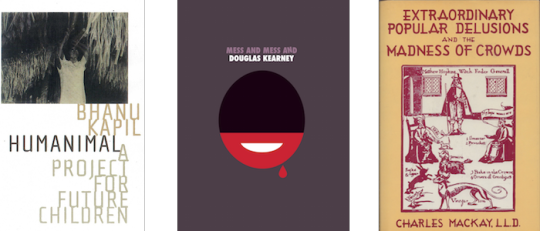
Humanimal: A Project for Future Children by Bhanu Kapil · Mess and Mess and by Douglas Kearney · Extraordinary Popular Delusions and the Madness of Crowds by Charles Mackay
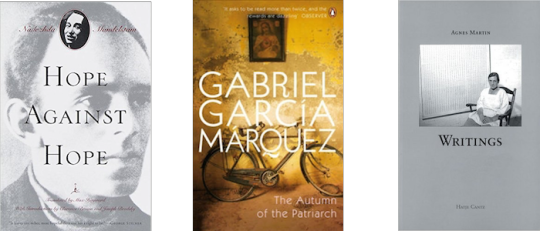
Hope Against Hope by Nadezhda Mandelstam · Autumn of the Patriarch by Gabriel García Márquez · Selected Writings by Agnes Martin
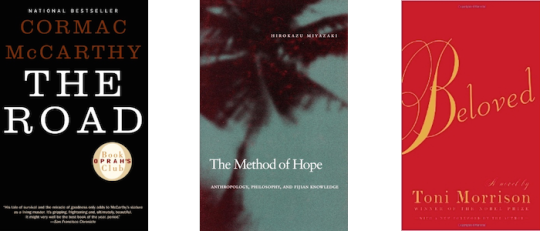
The Road by Cormac McCarthy · The Method of Hope by Hirokazu Miyazaki · Beloved by Toni Morrison

Collected Poems by George Oppen · Omon Ra by Victor Pelevin · Apology by Plato

Gravity’s Rainbow by Thomas Pynchon · The Life of Poetry by Muriel Rukeyser ·Methodology of the Oppressed by Chela Sandoval
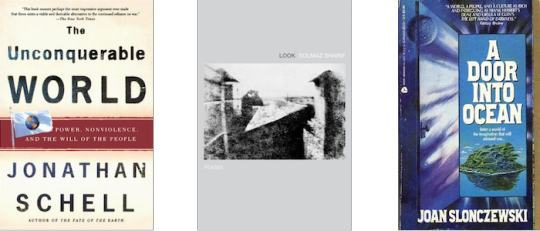
The Unconquerable World: Power, Nonviolence and the Will of the People by Jonathan Schell · Look by Solmaz Sharif · A Door Into Ocean by Joan Sloczewski
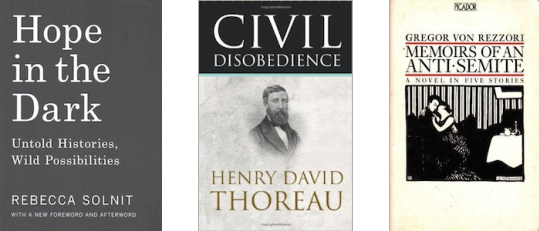
Hope in the Dark: Untold Stories, Wild Possibilities by Rebecca Solnit · Civil Disobedience by Henry David Thoreau · Memoirs of an Anti-Semite by Gregor Von Rezzori
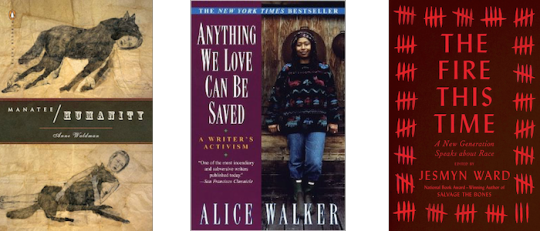
Manatee/Humanity by Anne Waldman · Anything We Love Can Be Saved by Alice Walker · The Fire This Time edited by Jesmyn Ward
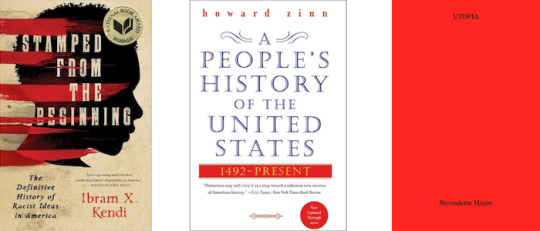
Stamped From the Beginning: The Definitive History of Racist Ideas in America by Ibram X ·A People’s History of the United States by Howard Zinn · Utopia by Bernadette Mayer
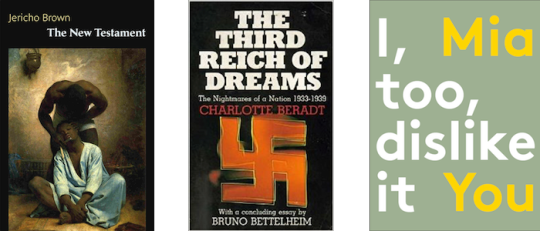
The New Testament by Jericho Brown · The Third Reich of Dreams by Charlotte Beradt · I, Too, Dislike It by Mia You

CHOPPER! CHOPPER!: Poetry from Bordered Lives by Verónica Reyes · Savage Coast by Muriel Rukeyser · Whisper Louise by Douglas Oliver
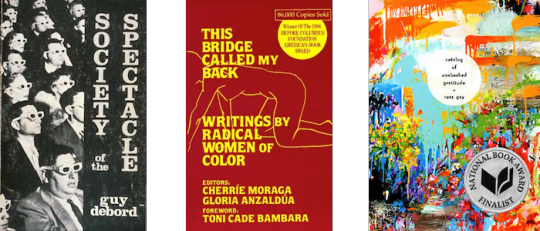
The Society of the Spectacle by Guy Debord · This Bridge Called My Back edited by Gloria Anzaldúa and Cherrie Moraga · Catalog of Unabashed Gratitude by Ross Gay
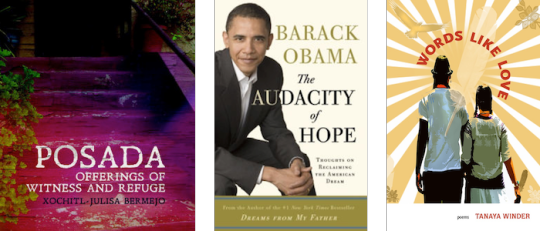
Posada by Xochitl-Julisa Bermejo · The Audacity of Hope by Barack Obama · Words Like Love by Tanaya Winder

Beastgirl & Other Origin Myths by Elizabeth Acevedo · The Undercommons by Stefano Harney and Fred Moten · Are Prisons Obsolete? by Angela Davis
3 notes
·
View notes
Link
From here on, images, artists, and collaborators that illuminate the fugitive, haptical potentials of being in “the hold” of digital space will be reposted. I will name these ongoing posts “Digital Hapticality.” By doing this, I aim to emphasize the overarching theoretical/ethical lens that I will both explicitly and implicitly point to over the course of my experiment w/ digital space from September to December 2017.
To explain some terms:
Fugitivity, as most notably transformed by Fred Moten’s re-readings of slavery as social death (Patterson 1982), represents Black optimism’s readings of the social life and freedom in Blackness’s fungibility and insurgency.
Hapticality, as defined by Stefano Harney and Moten, is an affective register unique to the African diaspora. While hapticality extends beyond the diaspora itself and is felt through assemblages and intimacies of solidarity and coalition (Harney & Moten 10), it necessarily returns to the image of the being in the hold of the slave ship as a way to articulate the miraculous ability to feel even in the most colonially violent atrocities. Continuing on this line, metaphorically studying this “feeling in this hold with others” opens up the potentials of a radical, fugitive sociality within the oppressive nature of online technologies--that soft/hardware explicitly built on post-racial ideals but implicitly anything but (Nakamura 1995, 2008).
Reading/viewing/feeling for hapticality online is, as I argue, necessary for understanding the impulses of various ethics, politics, and aesthetics of Blackness on- and offline. Further, if Blackness “holds up popular culture” and its individuals and collectives ”foster our most beloved internet objects” (Jackson 2016), and if “all thought is Black thought” (Sharpe 2016), then understanding these often ghostly present/absent impulses is most certainly indicative of wide-scale social, political, and methodological implications.
Or, perhaps better is to quote Moten himself:
“The coalition emerges out of your recognition that it’s fucked up for you, in the same way that we’ve already recognized that it’s fucked up for us. I don’t need your help. I just need you to recognize that this shit is killing you, too, however much more softly, you stupid motherfucker, you know?” (Halberstam in Harney & Moten 10).
0 notes
Text
The Oceanic Feeling
Tavia Nyong'
Nineteen-year-old Christopher Breaux fell hard for another straight-acting boy who wouldn’t love him back, confessing his love in a car parked in front of the girlfriend’s house. Like many a millennial, he took to Tumblr to share his feelings about a love he described, with portentous adolescent drama, as “malignant.” But the queerest song released so far by the artist now known at Frank Ocean hasn’t been an ode to boy-on-boy love and lust but a corrosive satire of “traditional” American marriage in the era of Kim Kardashian and Newt Gingrich. If hip-hop is the CNN of the ghetto, then “American Wedding” aims to be its TMZ as well, replete with celebrities and courtroom hijinks, muscle motors, and divorce settlements, with Ocean ruefully rubbernecking at all the car crashes en route to the good life.subscribe to TNI for $2 and get Vol. 9 today
“American Wedding” has attracted the proprietary attentions of paleo-rockers the Eagles, whose radio staple “Hotel California” the track is based on. But the real story here isn’t about the sampling wars. It’s about a scapegoat generation struggling to find a path through the crumbling infrastructure of the American dream.
It has been said that while liberals won the culture wars of recent decades, the right won the political and economic ones. The absurdly elevated status of “marriage equality” as the ne plus ultra of gay rights is a symptom of this unhappy dispensation. Who wants equality, after all, on such threadbare terms? Sensing a bait and switch, Ocean takes down love, American style, in merciless couplets like:
She said, ‘I’ve had a hell of a summer, so baby, don’t take this hard But maybe we should get an annulment, before this goes way too far.’
Like Pretty Woman in reverse, “American Wedding” descends from true love to crass commercial exchange, reminding us on the outro that “we been some hustlers since it began.”
But this deconstruction of romantic comedy is done in the name of a different, murkier ideal of love, a redemptive love that won’t quite fit into the comforting melodic or narrative resolution of pop culture. We heard strains of such a love on Ocean’s performance at the 2012 VMA awards, where he delivered an assonant, astringent version of “Thinkin Bout You,” the opening track on Channel Orange. He wonders if his beloved is willing to “think so far ahead, cuz I’ve been thinkin’ bout forever.” But such a horizon can clearly no longer find expression in the shelf-worn sentiments of “till death do us part.” The ass-backwardness of the Eagles’ litigious response to Ocean’s meditation on love and commitment is best captured by NCWYS in the SoundCloud comments to “American Wedding”:
If you older people think that the younger generation is out of control and doing everything incorrectly then you should absolutely love this song, but you don’t.
Ocean is a practiced journeyman of popsoul songcraft, as the early demos on the fan-compiled Lonny Breaux Collection prove, but his writing on Channel Orange makes his preceding material for other artists seem like throat clearing. On “Sweet Life,” a sharply observed reverie of black-picket-fence California dreaming, Ocean sardonically queries his pampered date: “So why see the world, when you got the beach?” He elongates “world” to contrast with the punched out “beach” in a way that tells us everything we need to know about his mournful acceptance of life’s cruel optimism. “Sweet Life” makes the extended parable of parental neglect on “Super Rich Kids” almost superfluous, except for the self-conscious scene setting it adds—mixing substance abuse and class snobbery into a potent cocktail of something called “upward mobility”:
We’ll both be high The help don’t stare They just walk by They must don’t care.
This is the way Ocean inherits the past: not by respecting tradition, or Don Henley, but by staring down the foreshortened horizons and complacent inequality that the frantic pursuit of wealth or happiness brings.
Not that Ocean is lecturing, mind you, although Sierra Leone, sex work, global warming, and the hijab all make appearances in his rapidly expanding oeuvre. He is singing over the soundtrack of history, blunting its force with tried and true teenage tactics of insult, grandiosity, and desperate need. At 24 he isn’t quite old enough to know that he shouldn’t care, which is why he can gloat over “expensive news” on a pricey widescreen one moment, and say “my TV ain’t HD, that’s too real” in another. His is a realism that needs to be able to blur out of focus when it’s too intense or not intense enough, and the drugs come in handy. But so does channel surfing; on Channel Orange television is his angel of history, a flickering window onlooking the mounting wreckage of the past as he is blown into the future.
Despite his Tumblr post comparing the intensity of same sex love to “being thrown from a plane,” the theme of Channel Orange is less sexual orientation than chemical disorientation. Recreational substances surface frequently, often as a metaphor for a relationship gone wrong. Or is it the other way around, and addiction is now the core, common experience a generation is struggling to give sense to, turning to romantic clichés like “unrequited love” in a search for a more familiar, respectable language for it?
Frank’s oceanic feelings on Channel Orange crash in waves that obliterate distinctions between gay, bi, or straight. Some of the ostensibly straight songs, except for their pronouns, feel suspiciously same-sex. And when heterosexuality is foregrounded, it never resolves any confusions, it only produces new ones. The artistic showpiece of the album, the ten-minute long “Pyramids,” is an afrofabulation of ancient Egypt and postmodern Las Vegas, centered on a woman dressing for her job as a stripper, while her man looks on, waiting for her to “hit the strip” and “keep my bills paid.” But the song is a far cry from big pimpin’. “Pyramids” is drenched in delusions of the good life in a “top floor motel suite,” cruising on empty confused for the upward mobility that is now as rare as water in the American desert. Ocean has a heartfelt respect for his Afrocentric queen—“we’ll run to the future shining like diamonds in a rocky world”— but the feeling tone of “Pyramids” is closer to Janelle Monáe’s “Many Moons” than Michael Jackson’s “Remember the Time.” That is, where Jackson celebrated an image of a past in which we were kings and queens, Monáe and Ocean take a fish-eye view of a society where a multihued social apex rests atop masses of brown, black, and beige bodies “working at the pyramid,” like the slaves who built the original ones.
Where CNN anchor Anderson Cooper justified his belated coming out in terms of the reporter’s obligation not to get in the way of the news, Ocean knows better. A black boy is always getting in the way of the news. At 18 he fled Hurricane Katrina for Los Angeles. But as Fred Moten put it, “I ran from it, and was still in it” pretty much sums up the black experience in America. Channel Orange starts in a similarly fucked-up atmosphere—“A tornado flew around my room”—and ends with “Forrest Gump” perhaps the most oddball musical portrait of same-sex love since “Johnny Are You Queer?” A three-legged race featuring Tom Hanks’ dimwitted but fleet-footed hero and Christopher Breaux’s beau, “Forrest Gump” boils Hollwood sap down to a lubricious bump and grind:
my fingertips and my lips they burn from the cigarettes forrest gump you run my mind boy running on my mind boy
“Forrest Gump” is rhythm and blues as dark camp, nostalgia repurposed by a generation too young to remember, a generation whose cultural thefts seem premised on the awareness that anything original they create could be stolen.
But don’t confuse Ocean’s approach for pastiche or retromania, despite his affection for old cars and the vocal stylings of Prince, Stevie Wonder, and Donnny Hathaway. Just when you think he is recycling the familiar, he gives you something incredibly raw and real. On his first appearance on broadcast television, Ocean scaled the national-media echo chamber down to a backseat taxicab confessional, sharing a universal angst at a human level rarely captured by the contemporary celebrity coming out, with its strict protocols for explaining the murkiness of desire away:
He said Allah Hu Akbar I told him don’t curse me Bo Bo you need prayer I guess it couldn’t hurt me.
“Bad Religion” leaves it unclear whether it is his taxi driver’s effusive piety or his own devotion to the cult of true love that is more stunning. Confusing spirituality with a therapy designed to sand our sharp edges into shape for this world, Ocean is awestruck in a way that has little to do, in the end, with either Islamophobia or homophobia.
Rather, “Bad Religion” finds a pivot point in the “and” of Freud’s Civilization and Its Discontents, the book where Freud psychoanalyzed the oceanic feeling of cosmic oneness felt by natural mystics and prophesied that our adjustment to society would only ever leave us frustrated and unhappy. “The price we pay for our advance in civilization,” Freud warned, “is a loss of happiness through the heightening of the sense of guilt,” and “Bad Religion” has plenty of guilt to spare. But it also never fails to convey the sense of striving and resilience Freud grudgingly acknowledges when he notes, “We are never so defenseless against suffering as when we love, never so helplessly unhappy as when we have lost our loved object or its love. But this does not dispose of the technique of living based on the value of love as a means to happiness.”subscribe to TNI for $2 and get Vol. 9 today
Blown from New Orleans by the unnatural calamity of racist and economic neglect, separated from his beloved by lack of reciprocation, Ocean never stops striving for “the technique of living based on the value of love.” Whatever, wherever that may be. Even a curse, after all, probably couldn’t hurt him.
When Ocean, on his Tumblr, greeted us as “human beings spinning on blackness,” he invited us into that cab alongside him, but also onto the edge of that oceanic feeling of cosmic oneness that Freud could only associate with regression, so convinced was he that satisfaction was something all humans left in the womb.A version of this essay first appeared at Bully Bloggers
But spinning on blackness needn’t be just an image for depression, addiction, burn out, or malignancy. It could also be Ocean sidling up in an undercommons of prayer and malediction, where the singular soul brushes up against the dark night of the universe. Maybe that’s why a conventional coming out, with its endless reiterations of the transparently obvious and anodyne, seems beside the point. Frank Ocean isn’t like you or me; he isn’t even much like Christopher Breaux any longer.
https://thenewinquiry.com/essays/the-oceanic-feeling/
0 notes
Text
5 Questions with Daphne A. Brooks, Author of Liner Notes for the Revolution
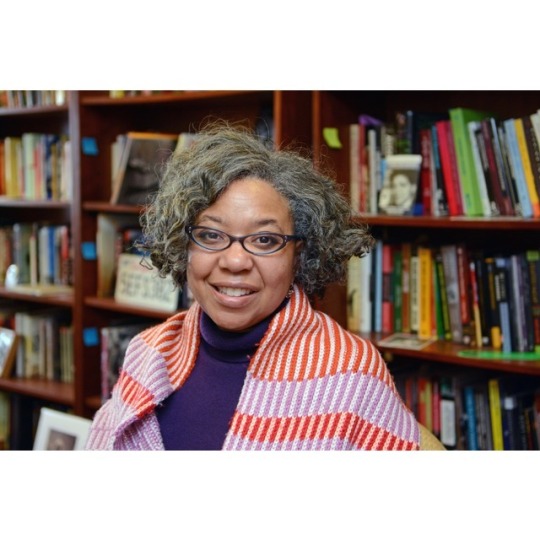
Daphne A. Brooks is the author of Jeff Buckley's Grace and Bodies in Dissent, and winner of the Errol Hill Award for outstanding scholarship in African American performance studies. A professor at Yale University, she has written liner notes to accompany the recordings of Aretha Franklin, Tammi Terrell, and Prince, as well as stories for the New York Times, The Guardian, The Nation, and Pitchfork.
Daphne Brooks is in conversation with Ann Powers discussing her new book Liner Notes for the Revolution: The Intellectual Life of Black Feminist Sound in our City Lights LIVE! discussion series on Wednesday, February 24
****
Where are you writing to us from? I am writing to you from?
I am writing to you from New Haven, CT… but my heart, and I’m not kidding about this, is in San Francisco—and Berkeley and Oakland and Menlo Park/Palo Alto—my hometown turf!
What’s kept you sane during the pandemic?
Baking, late-night television (Trevor Noah, Seth Meyers, Jimmy Fallon—watched in the 2AM hour), I May Destroy You (more episodes, please!), The Forty-Year-Old Version, the Childish Gambino record nobody listened to but me, the Fiona Apple record that everybody listened to early in the pandemic, Arlo Parks’ debut album, our beloved and beautiful young chocolate lab Gibson who, so incredibly sadly, we just lost . . .
What are 3 books you always recommend to people?
Ralph Ellison, Invisible Man; Toni Morrison, Jazz and/or A Mercy; Crime and Punishment (had to read it in the 6th grade)—plus one short story: James Baldwin, “Sonny’s Blues"
Which writers, artists, and others influence your work in general, and this book, specifically?
- Greil Marcus, Lipstick Traces: A Secret History of the 20th Century; - Alex Ross, The Rest Is Noise: Listening to the Twentieth Century; - Ann Powers, Good Booty: Love and Sex, Black and White, Body and Soul in American Music; - Albert Murray, The Hero and the Blues & assorted essays; - Ralph Ellison, Invisible Man & assorted essays; - Saidiya Hartman, Wayward Lives, Beautiful Experiments: Intimate Histories of Riotous Black Girls, Troublesome Women and Queer Radicals; - Toni Morrison, Jazz, Beloved, Playing in the Dark: Whiteness and the Literary Imagination; - Farah Jasmine Griffin, If You Can’t Be Free, Be A Mystery: In Search of Billie Holiday; - Gayle Wald, Shout, Sister, Shout! The Untold Story of Rock-and-Roll Trailblazer Sister Rosetta Tharpe; - Josh Kun, Audiotopia: Music, Race, and America; - Fred Moten, In the Break: The Aesthetics of the Black Radical Tradition, The Universal Machine, Black and Blur, Stolen Life
If you opened a bookstore, where would it be located, what would it be called, and what would your bestseller be?
BERKELEY, CALIFORNIA, full coffee bar, turntables and listening booths, extensive newsstand, extensive music books section, BIPOC sections, critical gender studies and queer theory sections, performance space, public library/donations space, extensive children’s lit area. It’s called: Words In Stereo. Bestseller: that’s a tough one! Maybe some kind of a book that hasn’t been conjured up yet, a collaborative endeavor by Amanda Gorman and Greta Thunberg.
11 notes
·
View notes